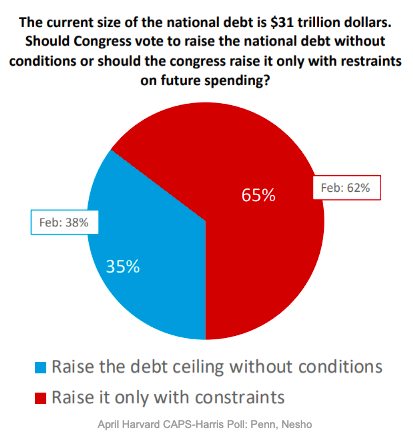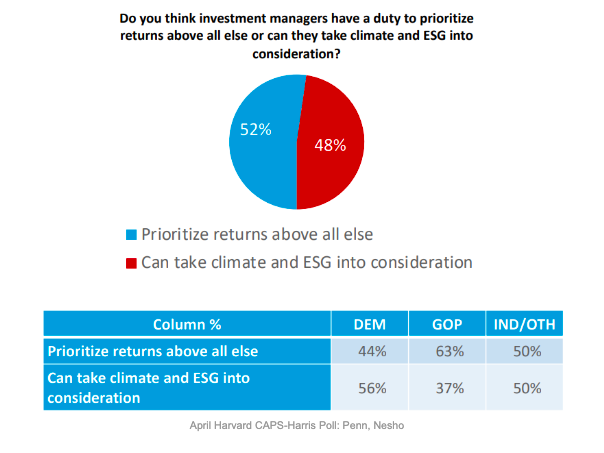Brief • 4 min Read
The news media landscape tilted this week, and Biden is set for a possible rematch with Trump. Yet in our America This Week survey, fielded from April 21st to April 23rd among 2,030 Americans, the issues the public has been focused on are relatively constant: Nearly nine in ten (87%) remain concerned about the economy and inflation (no change from the end of December), crime rates (81%, -1%-pt change), and political divisiveness (74%, -1%-pt change).
Fortunately, new polls bring fresh insight into other aspects of modern American life. For instance, did you know that more of us rely on lottery tickets rather than financial planners? In another new survey, we explore the potential of generative A.I. to improve email. And we have two new April Harvard CAPS-Harris Polls finding bipartisan support for debt negotiations and the revelation that most Americans have not heard of ESG. You can download the new ATW monthly summary tabs and deck here.
The Latest Financial Plan? Lotto Tickets & Fortune Tellers: Empower-Harris Poll
A new Harris Poll survey with Empower covered in Fortune and Fast Company finds that Americans will go to great lengths to avoid thinking about their financial planning.
- It’s more P.C. to talk about politics than money: While over (43%) of Americans talk about politics with other people and a third even (32%) discuss death, only a quarter (24%) said they talk about their finances with others.
- Lottery and psychics are more appealing than financial planners: (71%) of Americans said they bought a lottery ticket, and a quarter (24%) of millennials said they’ve spoken to a fortune teller. Still, only one-third (33%) have talked to a financial planner.
- And we’re more interested in celebrities’ net worth than our own: (58%) Americans know their net worth, and even fewer understand their partner’s (38%) or family’s (28%). Meanwhile, (28%) said they knew Elon Musk’s net worth.
- However, Americans recognize the need for open discussions: (62%) of people believe more open conversations about money are the key to financial freedom (66%) and closing the gender wage gap (62%).
Takeaway: “There is no question that financial taboos are standing in the way of the kind of transparency needed to pursue a financially healthy future. This data shows us that a culture of open and candid discussions about finances will enable us to tackle financial issues proactively,” says Abbey Lunney, Managing Director at The Harris Poll’s Thought Leadership and Futures Practice.
Does A.I. Mean A Second Life For Email? Fortune-Harris Poll
The email inbox was, at one point, ostensibly the perfect platform and, as a technology, hard to beat. But technology has given us more communication avenues than we know what to do with text, Slack, Gchat, Tweet, Signal, D.M., etc. And for some, email no longer serves society as we intended, leaving an opportunity for A.I. to improve it, according to a recent Fortune story highlighting Harris Poll data.
- First, how many are ‘too many’ emails?: Employees tend to burn out on emails once they receive fifty. And once they head north of that number, most say they can’t keep up.
- And written communication is only increasing: This year’s Grammarly-Harris Poll State of Business Communication report found that workers are spending on average nearly 16 hours alone each week on written communication, with the majority of that time dedicated to emails (6.42 hours, 21% YOY increase), compared to the 11 hours spent verbally communicating.
- Can A.I. help ease the email burden?: Recent Harris polling found that over two-thirds of Americans (68%) would be interested in using A.I. to assist with more effective communication at work, such as on emails.
Takeaway: A.I. can help email work more like a personal assistant, responding to certain emails for you, organizing and prioritizing responses based on urgency, and keeping unnecessary things out of view – all things email can, to varying degrees, do now. Yet there are still so many ways email isn’t working for us, even after decades of existence. From pattern recognition to editing and spam filtering, email is old technology ripe for A.I. reincarnation.
Majority of Voters Want A Balanced Budget: Harvard CAPS-Harris Poll
According to the April Harvard CAPS-Harris Poll covered in The Hill, our Harris Poll Chairman (and Stagwell Chairman/CEO) Mark Penn reports that the national debt and federal budget deficits are one of the top issues facing the country today identified by U.S. voters (#6 beyond issues like inflation, the economy, and crime).
- Two-thirds of voters (66%) think the U.S. government has too much debt, and over half (55%) think the government is spending too much.
- When told the national debt is $31 trillion, two-thirds of voters (65%) want Congress to raise the debt ceiling only with restraints on future spending:

- Bipartisan support for a balanced budget: 8 in 10 voters (81%), including (81%) of Democrats and (86%) of Republicans, support returning the country to a balanced budget. This is significant to find eight in ten Republicans and Democrats agreeing on anything.
Takeaway: The percentage of Americans who think the country is on the wrong track has ticked back up to (62%) as President Biden’s approval remains at (43%). “As Americans get more pessimistic about the economy again, the 2024 election may hinge on which party can put cultural issues to the side and focus on the core economic issues,” says Penn.
Most Voters Unfamiliar with ESG: Harvard CAPS-Harris Poll
ESG investing and governance are mission-driven priorities in most businesses today. Yet our April Harvard CAPS-Harris Poll finds many voters who must familiarize themselves with ESG (Environmental, Social, and Governance) investing.
- Only a third (36%) of U.S. voters say they have heard of ESG investing, with the remaining two-thirds (64%) having never heard of it:

- After being given the definition, just over half (52%) of voters think investment managers have to prioritize returns above all else rather than the option to consider climate and ESG concerns (48%).
- And voters are similarly split if they support Biden’s recent veto of a proposal that would bar retirement fund managers from incorporating ESG and climate considerations into their investing decisions (support the veto: 53% v. oppose the veto: 47%).
Takeaway: ESG remains featured in policy headlines, political debates, and corporate priority lists, as recent Google Cloud-Harris Poll research found that ESG ranks third in organizational priorities among global executives. The challenge is messaging focusing on the public, nearly half of whom support the concept, even if they don’t get the jargon.
Subscribe for more Insights
Subscribe to our newsletter for the latest trends in business, politics, culture, and more.
Download the Data
This survey was conducted online within the U.S. by The Harris Poll from April 21st to 23rd among a nationally representative sample of 2,030 U.S. adults.
Download
Subscribe for more Insights
Subscribe to our newsletter for the latest trends in business, politics, culture, and more.
Download the Data
This survey was conducted online within the U.S. by The Harris Poll from April 21st to 23rd among a nationally representative sample of 2,030 U.S. adults.
DownloadRelated Content








